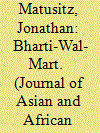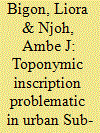|
|
|
Sort Order |
|
|
|
Items / Page
|
|
|
|
|
|
|
| Srl | Item |
| 1 |
ID:
137005


|
|
|
|
|
| Summary/Abstract |
Austronesia, one of the largest language families in the world, covers a vast area from Madagascar in the extreme west to Easter Island in the far east, Taiwan in the north to New Zealand in the south. The languages are spoken by the people of insular southeast Asia, Micronesia, Melanesia and Polynesia in the Pacific, as well as certain parts of the Asia mainland. The vernacular architecture of the people that belong to this language family shows certain shared characteristics that seem to indicate a common origin in the distant past. The Grand Shrines at Ise, Japan pose an intriguing phenomenon because they possess striking architectural features that are reminiscent of Austronesian vernacular architecture. This paper is an attempt to investigate the phenomenon using the findings of studies by experts from other disciplines such as historians, anthropologists, linguists and others, based on the link between culture, language and architecture.1
|
|
|
|
|
|
|
|
|
|
|
|
|
|
|
|
| 2 |
ID:
137009


|
|
|
|
|
| Summary/Abstract |
This paper analyzes the experience of Bharti-Wal-Mart, a joint venture between Wal-Mart and Bharti Enterprises (an Indian telecommunications company), based on the principles of glocalization theory. By and large, glocalization refers to the adaptation of multinational corporations (MNCs) to local cultures. MNCs achieve this by immersing themselves into local cultures and by adopting unconventional marketing techniques. A major finding of this analysis is that globalization is not monolithic. It is not a homogenizing factor that forces local cultures to follow the norms, practices, and values of a big corporation. In fact, Wal-Mart executives quickly learned that imposing the Bentonville blueprint on local Indian populations would be doomed to failure from the beginning. An important focus of this analysis is to establish a framework for greater understanding of the strategies adopted by Wal-Mart in India.
|
|
|
|
|
|
|
|
|
|
|
|
|
|
|
|
| 3 |
ID:
137007


|
|
|
|
|
| Summary/Abstract |
This article examines calls for the introduction of partisan politics into the District Assemblies system, which is the core institution in Ghana’s democratic decentralization program. I argue that in spite of constitutional provisions and an enabling legislation on the need for a ‘politically neutral’ District Assemblies system, this has not been the case, ironically partly due to the composition of the membership of the Assemblies as provided for in the 1992 Constitution and the unnecessary interferences by governments. This situation, the article notes, has undermined the effectiveness of the District Assemblies system. The article concludes by recommending certain measures that must be put in place if the situation is to be arrested and ensure the attainment of the goals of the District Assemblies system.
|
|
|
|
|
|
|
|
|
|
|
|
|
|
|
|
| 4 |
ID:
137006


|
|
|
|
|
| Summary/Abstract |
Colonial legal historiography has tended to focus on customary tribunals rather than ‘European’ courts. This article offers a new vantage point from which to view Kenya’s legal system by looking at colonial judges through the eyes of the trial lawyers who appeared before them. By the late 1950s, Asian lawyers were numerically superior to Europeans and there was only a handful of African advocates. The focus of this article is these advocates’ day-to-day court experiences, and their assessment of individual judges’ competence, roles and attitudes. Their oral testimony adds to our understanding of the function of Kenya’s superior courts and the characters and outlook of the judges and lawyers who staffed them.
|
|
|
|
|
|
|
|
|
|
|
|
|
|
|
|
| 5 |
ID:
137010


|
|
|
|
|
| Summary/Abstract |
Electoral violence in Nigeria has continued to defy every policy put in place to check it. A comparison of elections from the First Republic to the present Fourth Republic reveals that the focus of policy strategies are on the conduct and administration of elections without an attempt to change the objective of seeking political offices through elections. This objective, which is using political office to accumulate private wealth, is the reason politicians employ ruthless means to win elections. While immediate and short-term policies should continue to focus on eliminating rigging and thuggery during elections, medium and long-term policies should seek to reduce the material attractiveness of political offices, political corruption, and the capacity of politicians to accumulate private wealth from state offices.
|
|
|
|
|
|
|
|
|
|
|
|
|
|
|
|
| 6 |
ID:
137011


|
|
|
|
|
| Summary/Abstract |
The emergence of the Brazil, Russia, India, China and South Africa (BRICS) group of states as a new geopolitical power bloc has received substantial coverage in the media. South Africa’s inclusion in the group has been particularly controversial, and media attention tended to focus on the country’s relationship with China against the backdrop of the BRICS alignment. The media industry itself has also been a part of global movements of people and capital. This article seeks to establish how this relationship has been represented in the South African media, and to explore the attitudes of senior journalists and editors towards South Africa’s position within the changing global geopolitical landscape.
|
|
|
|
|
|
|
|
|
|
|
|
|
|
|
|
| 7 |
ID:
137004


|
|
|
|
|
| Summary/Abstract |
We examine a variety of problems relating to toponymic inscription processes in urban sub-Saharan Africa. The objective is to promote understanding of: the origins, evolution, nature, extent and social implications of these problems in an era of globalization; the vocabularies of built space; and the navigation techniques of inhabitants of supposedly nondescript built space in this region. We employed primary data based on in situ experiences and secondary data from published and unpublished documents. We found that the region’s toponymic inscription problem, its built space, and urban vocabularies are deeply embedded in its European colonial legacy. Furthermore, we found that urban residents in this region have devised functional means to navigate their seemingly nondescript space. These revelations promise to fill some historiographic gaps in the literature on toponymic inscription in Africa in particular and urban history and planning in general.
|
|
|
|
|
|
|
|
|
|
|
|
|
|
|
|
| 8 |
ID:
137008


|
|
|
|
|
| Summary/Abstract |
Civil Society and many youth activists were elated when the youth, those aged between 21 and 40 years, were given prominence in Ghana’s parliament after the 2012 elections. Indeed, as many as 44 young people were elected during Ghana’s 2012 Parliamentary Elections. Prior to this, the number of young people in Ghana’s parliament was negligible. In view of the demographic advantage of the youth and their invaluable contributions to Ghana’s political history, there have been incessant calls for their representation and an eventual return to the days of the 1950s when politics was dominated by the youth. The outcome of the 2012 Parliamentary Elections was therefore hailed as unprecedented and described by many as a giant step towards youth representation in national decision making. However, a survey of all the young parliamentarians and some 4400 young people carefully selected through purposive sampling provides the basis for this paper’s thesis that the growth in the number of young people in Ghana’s parliament does not necessarily guarantee youth representation in national decision making; rather, it promotes tokenism, exclusivity and co-optation of the youth into decision-making structures of state. The study makes practical recommendations to create a relationship between youth in Ghana’s parliament and youth representation.
|
|
|
|
|
|
|
|
|
|
|
|
|
|
|
|
|
|
|
|
|